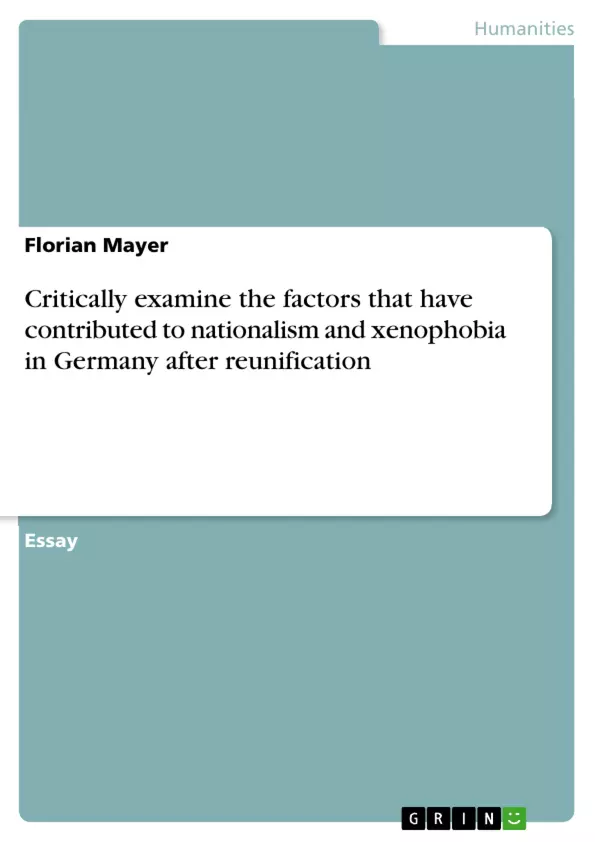For at least the last two-and-a-half decades, critical theory in the humanities and social sciences has been concerned, amongst other things, with exploring the myths and fictions of nationalist thought. Instead of the coherence of ′imagined communities′, or even the unity of the individual subject, it emphasises the multiple, shifting, fragmented and often contradictory modes of identification that characterise what are referred to variously as the ′postmodern′, ′postcolonial′, ′posthistorical′ or ′postideological′ conditions of the contemporary world. Yet recent history, specifically the decade following the end of the Cold War, has seen a rise in nationalist sentiments and struggles, and numerous wars have been fought over inclusive and exclusive conceptions of identity. Far from disappearing, arguments about national belonging and cultural difference have had increased prominence in the 1990s. In Europe, the reunified Germany, which had been at the centre of the ideological struggle between the East and the West during the Cold War has seen a resurgence of nationalism often manifested in aggression and discrimination against minorities. Contemporary bias crime in Germany increased significantly after reunification and remained at a relatively high, though fluctuating, level for the past decade. As a consequence, Germany today is not only struggling to come to terms with its National-Socialist past but also with the recent uprisings in nationalism and xenophobia and competing demands of difference and unity as it seeks to reconstruct itself in more humane and equitable ways. These issues are no less relevant today as we approach the end of 2007 - one year after a celebrated World Cup event, were Germany proclaimed "Zu Gast bei Freunden" - a year which saw racist incidents against minorities at so-called "Volksfesten" and other places erupt once again. In the following pages an attempt has been made to examine the causes and roots of the lasting crisis in German society by putting forward economic, psychological, political, historical, and cultural explanations.
Inhaltsverzeichnis (Table of Contents)
- Introduction
- General conditions for right-wing extremism in the new states
- Socio-economic Effects of Reunification
- Psychological Factors
- The Role of the GDR's Dictatorship and Education System
- Immigration and the state's response
Zielsetzung und Themenschwerpunkte (Objectives and Key Themes)
This text aims to critically examine the factors that have contributed to nationalism and xenophobia in Germany after reunification. It delves into the complex interplay of economic, psychological, political, historical, and cultural explanations that have fueled this phenomenon.
- The socio-economic effects of reunification on East Germany
- The psychological impact of the collapse of the GDR on East German identity
- The role of the GDR's dictatorship and education system in shaping nationalist attitudes
- The relationship between immigration and the rise of right-wing extremism
- The political responses to the rise of nationalism and xenophobia in Germany
Zusammenfassung der Kapitel (Chapter Summaries)
- Introduction: The text establishes the context of a resurgence in nationalist sentiments and struggles in the post-Cold War era, particularly in Germany. It highlights the significant increase in bias crime in Germany after reunification and underscores the societal challenge of addressing this issue.
- General Conditions for Right-Wing Extremism in the New States: This section explores the socio-economic and psychological factors that contributed to the rise of right-wing extremism in the former East Germany. It examines the impact of the collapse of the East German economy, the sense of disenfranchisement among East Germans, and the role of the GDR's dictatorship and education system in shaping nationalist attitudes.
- Immigration and the State's Response: This section examines the political explanations for the rise of racism in Germany, focusing on the issue of immigration and the state's response. It explores the history of Germany's asylum policy and its potential role in fueling xenophobic sentiments. The section also considers the lack of integration measures for immigrants and the impact of changes in asylum law on refugee rights.
Schlüsselwörter (Keywords)
This text explores key concepts such as nationalism, xenophobia, right-wing extremism, reunification, East Germany, GDR, immigration, asylum, identity, social change, and political response. The focus is on understanding the complex factors that contributed to the rise of these phenomena in Germany after reunification.
Frequently Asked Questions
What caused the rise of nationalism in Germany after 1990?
Factors include the socio-economic shocks of reunification, a sense of disenfranchisement in the former East Germany, and the psychological impact of the GDR's collapse.
How did the GDR's education system influence xenophobia?
The study suggests that the GDR's dictatorship and its specific education system played a role in shaping certain nationalist attitudes that resurfaced after the fall of the Wall.
What is the link between immigration and right-wing extremism in Germany?
The rise of xenophobia is often linked to the state's response to immigration, historical asylum policies, and a perceived lack of effective integration measures during the 1990s.
Did bias crimes increase after German reunification?
Yes, contemporary bias crimes in Germany increased significantly after reunification and remained at a fluctuating but relatively high level for the following decade.
How is Germany dealing with its National-Socialist past today?
Germany struggles to reconcile its historical Nazi past with modern uprisings in nationalism, seeking to reconstruct a national identity based on unity and difference.
- Citar trabajo
- Florian Mayer (Autor), 2003, Critically examine the factors that have contributed to nationalism and xenophobia in Germany after reunification, Múnich, GRIN Verlag, https://www.grin.com/document/13595



